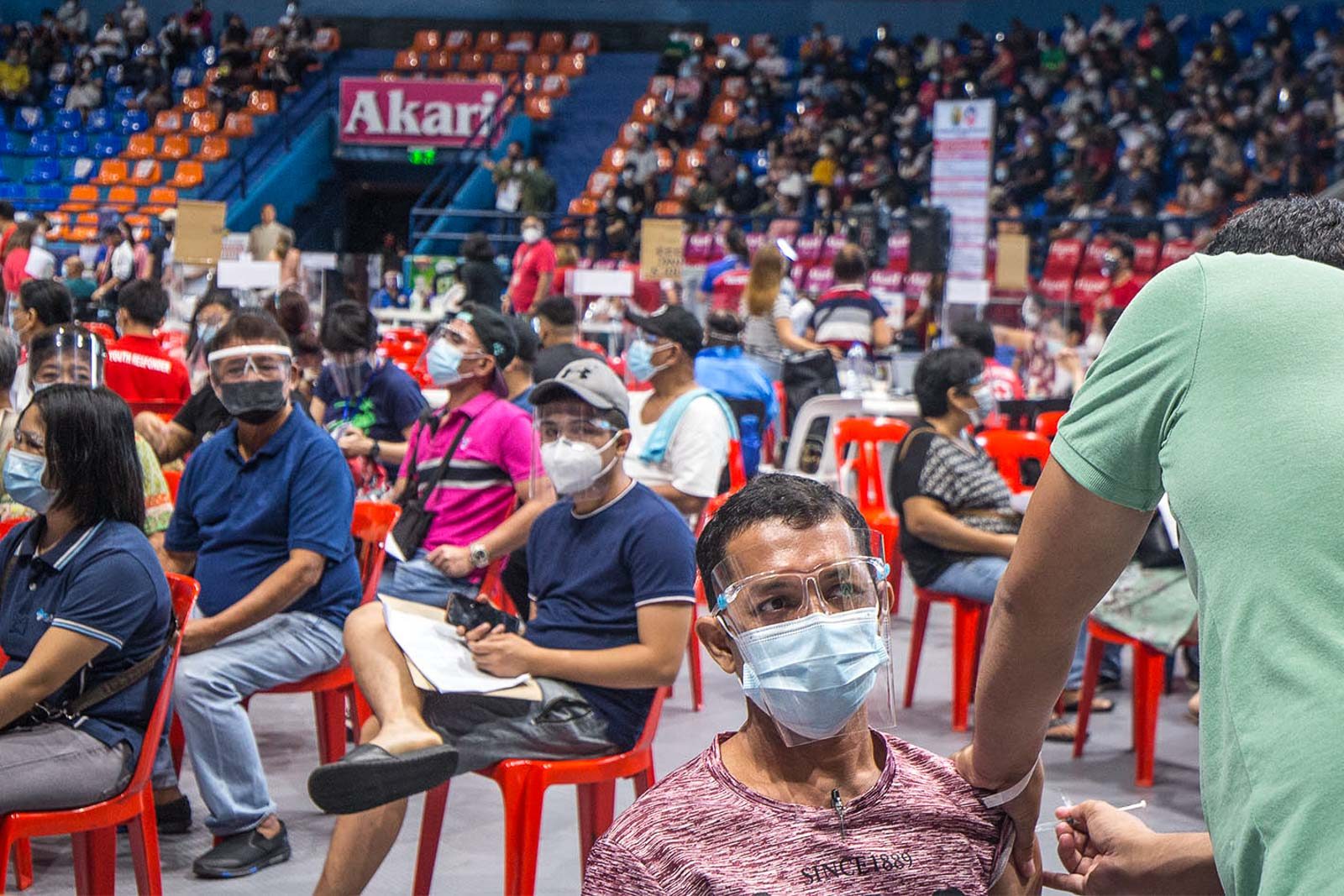SUMMARY
This is AI generated summarization, which may have errors. For context, always refer to the full article.


While the Philippines has closed deals and purchased COVID-19 shots from several pharmaceutical firms, government officials privy to negotiations were still unable to publicly disclose the exact prices of doses bought and used in the country’s mass vaccination campaign.
Speaking in a Senate committee of the whole hearing on Tuesday, June 15, vaccine czar Carlito Galvez Jr. and Finance Secretary Carlos Dominguez III told lawmakers that they were still bound by non-disclosure agreements (NDAs) signed with vaccine manufacturers “at this point in time.”
Lawmakers had pressed Galvez to state the exact cost of doses bought by the government so far, citing his earlier pronouncement in January that prices of vaccines could be stated publicly when negotiations with pharmaceutical companies and deliveries are completed. At the time, Galvez said it could also come earlier after supply agreements are signed.
“We cannot displace the price considering that this is still part of the NDA,” Galvez said.
Dominguez echoed this, saying: “This non-disclosure agreement is not our doing, this is the requirement of the suppliers and we cannot disclose trade secrets, and included in the trade secrets are the pricing. We can’t disclose that publicly without violating the non-disclosure agreement.”
Senate Minority leader Franklin Drilon had attempted to account for the cost of doses purchased by the government through taxpayers’ funds and multilateral loans, which included 26 million Sinovac doses, 10 million Sputnik V doses, and 13 million Moderna doses.
Galvez, however, could only say that Sinovac’s shot cost “more or less” P700 per dose and that its exact price could be disclosed to lawmakers in an executive session instead of a public hearing to comply with the signed NDA. The situation was similar for other vaccine suppliers, he added.
Price range given
During the hearing, Dominguez said while NDAs prohibited officials from announcing exact vaccine prices, the cost of vaccines paid for so far range from $6.75(about P325) to $27.59 (about P1,392) per dose.
Asked to explain the disparity in pricing, Dominguez said that he was not privy to the manner by which suppliers determined pricing. The finance secretary, however, noted that factors that could affect the cost of vaccines were the different types of vaccine platforms available, different price points due to the volumes of doses purchased, and the practice of pharmaceutical companies to price a medical product based on a country’s ability to pay for it.
As for vaccines secured but yet to be paid for and delivered to the Philippines, Dominguez said the average cost of vaccines to be purchased through funds from the national budget was an average P543 per dose. Through multilateral loans from the World Bank (WB), Asian Development Bank (ADB), and Asian Infrastructure Investment Bank (AIIB), cost per dose was P515 on average.
Aside from this, the cost of logistical needs for vaccination was also priced at some P48 per dose.
After stating average prices in the government’s vaccine program, Drilon asked Dominguez if he could say “with confidence” that prices agreed upon with suppliers were competitive. Dominguez said that he could not say for certain as other countries likewise signed their own NDAs with vaccine companies, making it difficult to compare costs.
“I cannot do that because I do not know what the other countries pay because they have their NDA as well. I just know that, you know, we have done our best and from unofficial sources which I cannot fully rely upon, we are more or less in the ball park,” Dominguez said.
Dominguez then cited that multilateral bodies like the ADB, AIIB, and WB, which handled vaccine procurements of different countries, check that the Philippines is not “overpaying” for vaccines. “That is a double check for us,” he said.
Transparency needed
While price ranges for the cost of vaccines were offered, Drilon asked the government’s pandemic officials how they intended to comply with the country’s accounting laws and the requirement to be transparent about public expenses even if NDAs were signed.
“The Constitution requires audit from COA (Commission on Audit). The Constitution requires transparency. How are we supposed to comply with the constitution requirement with this NDA or non-disclosure you have…signed?” Drilon asked.
Dominguez said that all costs of the vaccination program will be open to COA for auditing. He also echoed Galvez’ statement that vaccine prices could be disclosed in an executive session instead of a public hearing to comply with NDAs.
“I am one guy who really believes in transparency and I am disclosing as much as I can given the NDA,” he said.
Drilon found this amenable, saying it “complies with the disclosure and transparency requirements.”
The Senator sought for the executive session to be scheduled at the soonest time convenient for officials involved. – Rappler.com
*1 USD = P48.07
Add a comment
How does this make you feel?
There are no comments yet. Add your comment to start the conversation.